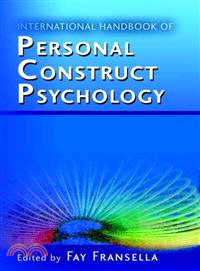International Handbook Of Personal Construct Psychology
商品資訊
ISBN13:9780470847275
出版社:John Wiley & Sons Inc
作者:Fransella
出版日:2003/05/09
裝訂/頁數:精裝/496頁
商品簡介
This handbook brings together, for the first time, a wide range of theories, research and practice that have grown out of Kelly's original concept.
It provides a reference on what has been done and insights into how further applications can be made within psychology and psychotherapy, and also informs non-psychologists and those unfamiliar with Kelly's techniques of its usefulness and applicability in other disciplines.
* This is the only comprehensive reference on PCP available
* Kelly's work is seminal and widely known
* Emphasises practical application to a wide-range of disciplines
作者簡介
目次
International Advisory Panel.
List of Contributors.
Introduction.
Acknowledgements.
Section I: The Psychology of Personal Constructs and its Philosophy.
Chapter 1. A Brief Introduction to Personal Construct Theory (George A. Kelly).
Chapter 2. George Alexander Kelly: The Man and his Theory (Fay Fransella and Robert A. Neimeyer).
Chapter 3. Kelly Versus Clockwork Psychology (Don Bannister).
Chapter 4. Kelly’s Philosophy of Constructive Alternativism (Gabriele Chiari and Maria Laura Nuzzo).
Chapter 5. Research in Personal Construct Psychology (Jack Adams-Webber).
Section II: Beliefs, Feelings and Awareness.
Chapter 6. The Logic of Passion (Don Bannister).
Chapter 7. Belief, Attachment and Awareness (Spencer A. McWilliams).
Chapter 8. Working with Anger (Peter Cummins).
Section III: From Theory to Practice.
Chapter 9. The Repertory Grid Technique (Richard C. Bell).
Chapter 10. Some Skills and Tools for Personal Construct Practitioners (Fay Fransella).
Chapter 11. Elicitation Methods to Fit Different Purposes (Pam Denicolo).
Chapter 12. Expert Systems (Mildred L.G. Shaw and Brian R. Gaines).
Section IV: Individuals in Relation to Society.
Chapter 13. Social Relations in the Modern World (Devorah Kalekin-Fishman).
Chapter 14. Cross-Cultural Construing (Jörn W. Scheer).
Chapter 15. Forensic Personal Construct Psychology: Assessing and Treating Offenders (James Horley).
Chapter 16. Making Sense of Dependency (Beverly M.Walker).
Chapter 17. Personal Construct Theory and Politics and the Politics of Personal Construct Theory (Don Bannister).
Chapter 18. Moving Personal Construct Psychology to Politics: Understanding the Voices with which we Disagree (Dusan Stojnov).
Section V: Personal Change and Reconstruction.
Part 1: A Theoretical Understanding.
Chapter 19. Psychological Disorder as Imbalance (David Winter).
Chapter 20. From Theory to Research to Change (Fay Fransella).
Chapter 21. An Approach to Post-Traumatic Stress (Kenneth W. Sewell).
Part 2: The Process of Change.
Chapter 22. Is Treatment a Good Idea? (George A. Kelly).
Chapter 23. An Audacious Adventure: Personal Construct Counselling and Psychotherapy (Franz R. Epting, Marco Gemignani and Malcolm C. Cross).
Chapter 24. Personal Construct Psychotherapy and the Constructivist Horizon (Robert A. Neimeyer and Scott A. Baldwin).
Chapter 25. Experiential Personal Construct Psychotherapy (Larry Leitner and Jill Thomas).
Chapter 26. The Evidence Base for Personal Construct Psychotherapy (David Winter).
Section VI: Development and Education.
Part 1: Development.
Chapter 27. Children’s Development of Personal Constructs (James C. Mancuso).
Chapter 28. Constructive Intervention when Children are Presented as Problems (Tom Ravenette).
Part 2: Education.
Chapter 29. Teacher–Student Relations at University Level (George A. Kelly).
Chapter 30. Construing Teaching and Teacher Education Worldwide (Maureen Pope).
Chapter 31. A Psychology for Teachers (Phillida Salmon).
Chapter 32. Learning and Diagnosis of Learning Results (Martin Fromm).
Section VII: Understanding Organizations
Chapter 33. The Power of a Good Theory (Sean Brophy, Fay Fransella and Nick Reed).
Chapter 34. Making Sense of the ‘Group Mind’ (Adrian Robertson).
Chapter 35. The Struggles of Organizational Transitions (Nelarine Cornelius).
Chapter 36. How can we Understand One Another if we don’t Speak the same Language? (Devi Jankowicz).
Chapter 37. Clarifying Corporate Values: A Case Study (Sean Brophy).
Section VIII: Philosophical and Religious Influences on the Thinking of George Kelly.
Chapter 38. The Phenomenological Context of Personal Construct Psychology (Trevor Butt).
Chapter 39. Pragmatism and Religion: Dewey’s Twin Influences? (Bill Warren).
Section IX: Living with Personal Construct Psychology: Personal Accounts.
Chapter 40. Personal Construct Psychology and Me (Dorothy Rowe).
Chapter 41. A Psychology of Questions (Miller Mair).
Chapter 42. Kelly’s Influence on Research and Career (Rue L. Cromwell).
Section X: Reaching Out.
Chapter 43.1 Nursing (Jacqui Costigan, Julie M. Ellis and Julie Watkinson).
Chapter 43.2 Family Therapy (Harry Procter).
Chapter 43.3 The Metropolitan Police, London: A Personal Account (John Porter).
Chapter 43.4 A Sporting Use of Personal Construct Psychology (David Savage).
Chapter 43.5 Artificial Intelligence (Jack Adams-Webber).
Chapter 44. New Avenues to Explore and Questions to Ask (Fay Fransella).
Appendix 1. Theoretical Definitions.
Appendix 2. Some Basic Books on Personal Construct Psychology.
Appendix 3. Computer Programs and Websites.
References.
Index.
主題書展
更多書展今日66折
您曾經瀏覽過的商品
購物須知
外文書商品之書封,為出版社提供之樣本。實際出貨商品,以出版社所提供之現有版本為主。部份書籍,因出版社供應狀況特殊,匯率將依實際狀況做調整。
無庫存之商品,在您完成訂單程序之後,將以空運的方式為你下單調貨。為了縮短等待的時間,建議您將外文書與其他商品分開下單,以獲得最快的取貨速度,平均調貨時間為1~2個月。
為了保護您的權益,「三民網路書店」提供會員七日商品鑑賞期(收到商品為起始日)。
若要辦理退貨,請在商品鑑賞期內寄回,且商品必須是全新狀態與完整包裝(商品、附件、發票、隨貨贈品等)否則恕不接受退貨。
























